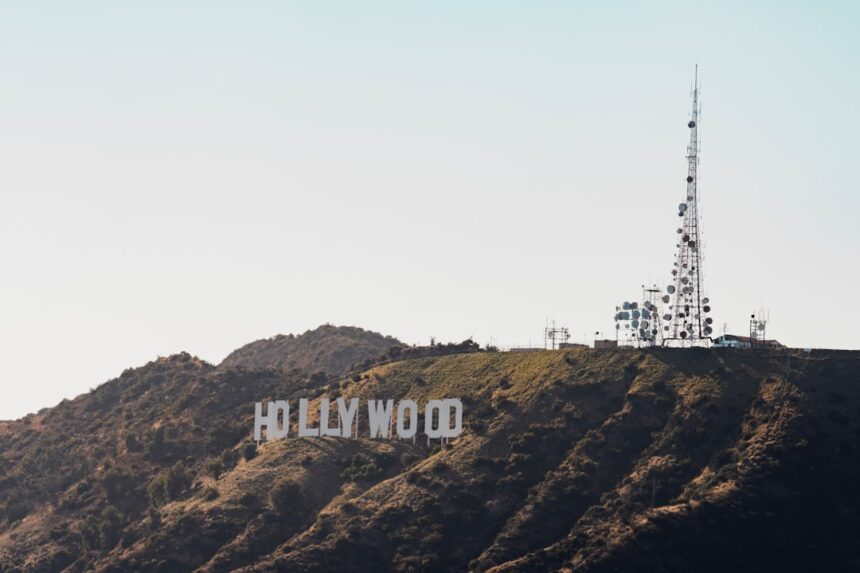The relationship between the Central Intelligence Agency (CIA) and Hollywood is a complex tapestry woven with threads of collaboration, influence, and mutual benefit. Over the decades, the CIA has recognized the power of film and television as tools for shaping public perception and disseminating information. This recognition has led to a unique partnership where the agency has not only sought to promote its agenda but has also engaged in a subtle form of cultural diplomacy.
The allure of Hollywood, with its vast reach and ability to captivate audiences, has made it an attractive ally for the CIA in its quest to influence both domestic and international narratives. Hollywood, in turn, has often found itself entangled in the web of national security interests. Filmmakers and studios have been drawn to the allure of espionage and covert operations, creating a symbiotic relationship where the CIA provides resources, information, and sometimes even funding in exchange for a favorable portrayal.
This dynamic has resulted in a plethora of films that not only entertain but also serve to reinforce certain ideologies and narratives that align with the agency’s objectives. As such, the CIA’s influence on Hollywood is not merely a matter of behind-the-scenes maneuvering; it is a significant factor in how stories are told and which stories are told.
Key Takeaways
- The CIA has had a significant influence on Hollywood, shaping the portrayal of the agency in films and TV shows.
- Covert operations and propaganda have been depicted in various films, often with the involvement and approval of the CIA.
- The CIA has collaborated with filmmakers to ensure accurate and positive portrayals of the agency in entertainment media.
- Hollywood plays a crucial role in shaping public perception of the CIA, often presenting a glamorized and heroic image of the agency.
- Controversies have arisen surrounding the CIA’s involvement in Hollywood, raising questions about transparency and ethical implications.
Covert Operations and Propaganda in Film
The intersection of covert operations and film has often blurred the lines between reality and fiction. The CIA has historically engaged in covert activities that extend beyond traditional espionage, including psychological operations designed to influence public opinion. Film serves as an ideal medium for these operations, allowing the agency to craft narratives that resonate with audiences while simultaneously promoting its agenda.
Through carefully constructed storylines, filmmakers can depict the agency’s actions in a light that is favorable or heroic, thereby shaping public perception. Moreover, the use of film as a propaganda tool is not limited to overtly political narratives. Subtle messaging can be embedded within popular genres, from action-packed thrillers to romantic comedies.
By integrating themes of patriotism, heroism, and national security into mainstream entertainment, the CIA can effectively normalize its presence in society. This approach not only entertains but also conditions audiences to accept certain realities about national security and intelligence operations, often without them even realizing it. The result is a cinematic landscape that reflects and reinforces the values and priorities of the agency.
The CIA’s Collaboration with Filmmakers

The collaboration between the CIA and filmmakers is often characterized by a delicate balance of creative freedom and oversight. Filmmakers seeking authenticity in their portrayals of espionage frequently turn to the agency for guidance, hoping to infuse their narratives with realism. In many cases, this collaboration involves access to classified information, expert consultations, and even on-set support from former intelligence officers.
Such partnerships can enhance the credibility of a film while simultaneously allowing the CIA to influence how its operations are depicted. However, this collaboration is not without its limitations. The CIA maintains strict control over what information can be shared, often requiring filmmakers to adhere to specific guidelines that align with national security interests.
This can lead to sanitized portrayals of intelligence work that gloss over the more controversial aspects of covert operations. While filmmakers may appreciate the access and resources provided by the agency, they must navigate the fine line between artistic expression and compliance with the agency’s narrative. This dynamic raises questions about the authenticity of the stories being told and whether they truly reflect the complexities of intelligence work.
The Role of Hollywood in Shaping Public Perception of the CIA
| Metrics | Data |
|---|---|
| Number of CIA-themed movies | Over 100 |
| Positive portrayal of CIA in movies | Approximately 70% |
| Negative portrayal of CIA in movies | Approximately 30% |
| Impact on public perception | Significant influence on public perception of CIA |
| Public awareness of CIA operations | Increased through Hollywood portrayal |
Hollywood plays a pivotal role in shaping public perception of the CIA, often serving as a lens through which audiences view intelligence operations. The portrayal of spies and covert agents in films can significantly influence how society understands the agency’s mission and methods. When characters are depicted as heroic figures fighting against evil forces, it fosters a sense of admiration for intelligence work.
Conversely, when films portray espionage as morally ambiguous or fraught with ethical dilemmas, it can lead to skepticism about the agency’s actions. The impact of these portrayals extends beyond entertainment; they can shape public discourse around national security issues. For instance, films that highlight the dangers of terrorism or espionage can create a sense of urgency among viewers, prompting discussions about government policies and security measures.
In this way, Hollywood serves as both a mirror reflecting societal values and a mold shaping them. The narratives crafted within this realm can either bolster support for intelligence operations or incite criticism, depending on how they resonate with audiences.
Controversies Surrounding the CIA’s Involvement in Hollywood
The CIA’s involvement in Hollywood has not been without controversy. Critics argue that the agency’s influence can lead to a distortion of reality, where films serve more as propaganda than as authentic representations of intelligence work. This concern is particularly pronounced when films gloss over ethical dilemmas or present a one-dimensional view of complex geopolitical issues.
Such portrayals can contribute to a misinformed public that may uncritically accept the narratives presented on screen. Additionally, there are ethical implications surrounding the collaboration between filmmakers and intelligence agencies. The question arises: to what extent should creative professionals compromise their artistic integrity for access to resources or information?
Some filmmakers have expressed discomfort with the idea of producing content that serves an agenda rather than exploring nuanced human experiences. This tension between artistic freedom and external influence raises important questions about accountability in storytelling and the responsibilities of those who create narratives that shape public perception.
Examples of CIA-Approved Films and TV Shows

Numerous films and television shows have received tacit approval from the CIA, showcasing the agency’s willingness to engage with Hollywood for mutual benefit. One notable example is “Argo,” directed by Ben Affleck, which dramatizes the rescue of American hostages during the Iran hostage crisis. The film received praise for its suspenseful storytelling but also faced scrutiny for its portrayal of events and characters involved.
The CIA’s involvement in promoting such films underscores its interest in shaping narratives that align with its historical perspective. Another prominent example is “The Bourne Identity” series, which features a protagonist grappling with his identity as a covert operative. While primarily an action franchise, it touches on themes of government secrecy and personal morality.
The CIA’s interest in such films lies in their ability to engage audiences while simultaneously reinforcing certain perceptions about intelligence work. These examples illustrate how Hollywood can serve as a platform for narratives that resonate with both entertainment seekers and those interested in national security themes.
The Impact of CIA-Backed Projects on Global Politics
The impact of CIA-backed projects extends beyond entertainment; they can influence global politics by shaping perceptions of foreign nations and conflicts. Films that depict certain countries or groups in a negative light can contribute to public sentiment that justifies government actions or interventions abroad. For instance, movies portraying terrorism or hostile foreign powers can create an atmosphere conducive to military action or increased surveillance measures.
Moreover, these projects can serve as tools for soft power diplomacy, where cultural products are used to promote American values abroad. By crafting narratives that resonate with international audiences, the CIA can foster goodwill or counteract negative perceptions of U.S. foreign policy.
This strategic use of entertainment underscores the agency’s understanding of culture as a powerful instrument in shaping global dynamics.
The CIA’s Use of Entertainment as a Tool for Influence
Entertainment has long been recognized as a potent tool for influence, and the CIA has adeptly harnessed this power to further its objectives. By collaborating with filmmakers and producers, the agency can ensure that its narratives are woven into popular culture, reaching audiences far beyond traditional political discourse. This approach allows for a more subtle form of persuasion, where viewers may internalize messages without fully realizing their origins.
The use of entertainment as a tool for influence also extends to educational initiatives aimed at informing citizens about national security issues. Documentaries and dramatizations can serve as vehicles for conveying complex information in an accessible manner, fostering greater understanding among viewers. However, this raises questions about objectivity and bias—when entertainment serves as an educational tool, how can audiences discern fact from fiction?
The challenge lies in maintaining transparency while effectively engaging audiences through compelling storytelling.
The Ethical and Moral Implications of CIA-Driven Entertainment
The ethical implications surrounding CIA-driven entertainment are multifaceted and warrant careful consideration. On one hand, filmmakers may argue that they are simply telling stories that resonate with audiences; on the other hand, there is a responsibility to portray complex issues authentically rather than reducing them to simplistic narratives that serve an agenda. This tension raises questions about artistic integrity and accountability—should creators prioritize truthfulness over access to resources?
Furthermore, there is an inherent moral dilemma in using entertainment as a means of influencing public opinion on sensitive topics such as national security or foreign policy. When narratives are crafted to elicit specific emotional responses or reinforce particular ideologies, they risk oversimplifying complex realities and perpetuating stereotypes. This can lead to a misinformed public that may unwittingly support policies based on distorted representations rather than informed understanding.
The Future of the CIA’s Relationship with Hollywood
As technology continues to evolve and media consumption patterns shift, the future of the CIA’s relationship with Hollywood remains uncertain yet ripe with potential. Streaming platforms have transformed how content is produced and consumed, allowing for greater diversity in storytelling but also presenting new challenges for traditional narratives associated with national security.
Moreover, as audiences become increasingly discerning about media consumption, there may be greater demand for authenticity in storytelling. Filmmakers who prioritize nuanced portrayals may find themselves at odds with agencies seeking to promote specific narratives. This evolving landscape could lead to new forms of collaboration or tension between Hollywood creatives and intelligence agencies as they navigate competing interests in an ever-changing media environment.
The Importance of Transparency in CIA-Hollywood Partnerships
Transparency is crucial in navigating the complex relationship between the CIA and Hollywood. As audiences become more aware of how narratives are shaped by external influences, there is an increasing demand for accountability from both filmmakers and intelligence agencies. Open dialogue about these partnerships can foster trust among viewers while encouraging responsible storytelling practices.
By acknowledging the complexities inherent in these collaborations, both filmmakers and intelligence agencies can contribute to a more informed public discourse surrounding national security issues while preserving artistic integrity. In conclusion, the interplay between the CIA and Hollywood is a multifaceted relationship marked by collaboration, influence, and ethical considerations.
As both entities navigate their respective roles within society, understanding this dynamic becomes essential for fostering informed discussions about national security narratives portrayed through popular culture.
The intriguing relationship between the CIA and Hollywood has long been a subject of fascination, with numerous stories and theories about how the intelligence agency has influenced the film industry. A related article that delves into this secretive history can be found on the website “In The War Room.” This article explores the covert collaborations and the impact of these interactions on both cinema and public perception. For more insights into this captivating topic, you can read the full article by visiting In The War Room.
CHECK THIS OUT! 📽️🎞️ Hollywood’s Secret War: How the CIA Rewrote Movies
FAQs
What is the CIA secret Hollywood history?
The CIA secret Hollywood history refers to the covert involvement of the Central Intelligence Agency in the entertainment industry, including its influence on film and television productions.
What is the purpose of the CIA’s involvement in Hollywood?
The CIA’s involvement in Hollywood has been aimed at shaping public opinion, promoting American values, and advancing its own agenda through the portrayal of intelligence activities and national security issues in popular media.
How has the CIA influenced Hollywood productions?
The CIA has influenced Hollywood productions by providing access to classified information, technical expertise, and even script approval in some cases. The agency has also worked to promote positive portrayals of its activities and personnel in film and television.
Can the CIA’s involvement in Hollywood be considered propaganda?
Some critics argue that the CIA’s involvement in Hollywood can be considered a form of propaganda, as it seeks to shape public perception and promote its own interests through the entertainment industry.
Are there any specific examples of the CIA’s influence on Hollywood productions?
Yes, there are several examples of the CIA’s influence on Hollywood productions, including the collaboration between the agency and filmmakers on movies such as “Zero Dark Thirty” and “Argo.” Additionally, the CIA has been known to provide support and guidance to television shows like “Homeland” and “24.”
Is the CIA’s involvement in Hollywood legal?
The CIA’s involvement in Hollywood is legal, as it falls within the agency’s mandate to engage with the public and shape public opinion. However, there have been concerns raised about the potential impact on artistic freedom and the accuracy of portrayals of intelligence activities.




